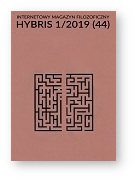THE TRIGGER EFFECT: COGNITIVE BIASES AND FAKE NEWS
THE TRIGGER EFFECT: COGNITIVE BIASES AND FAKE NEWS
Author(s): Tommaso OstillioSubject(s): History of Philosophy, Philosophical Traditions, Special Branches of Philosophy
Published by: Wydawnictwo Uniwersytetu Łódzkiego
Keywords: populism; online media; cognitive bias; impulsive behavior; political discourse; social media
Summary/Abstract: This research study focuses on the problem of populistic propaganda online. In particular, this research study provides three case studies gathered in a Facebook Group of the Italian populistic movement Movimento 5 Stelle. On the one hand, the three case studies provide three powerful counterexamples to the thesis that online media are purposeful aggregator of people. In fact, this research study finds that online media are the perfect environment for populism to thrive. For online media seem to foster the aggregation of people into groups whose main common denominator is the total refusal of anything that opposes the groups’ views. On this basis, this paper provides evidence that online media may impoverish democratic confrontation. On the other hand, this paper finds that the one of the causes of the rapid rise of populistic movements in Western countries might also be related to the problem of cognitive biases. Indeed, the case studies presented in the paper posit the existence of something that is addressed as the trigger effect, i.e. agents’ tendency to react impulsively to any kind of content that fits agent’s views about current events. Specifically, this research study finds that the activation of the trigger effect might be a direct consequence of the activation of the narrow framing bias and of the anchoring heuristic in presence of fake news.
Journal: Internetowy Magazyn Filozoficzny HYBRIS
- Issue Year: 2018
- Issue No: 44
- Page Range: 86-104
- Page Count: 19
- Language: English

